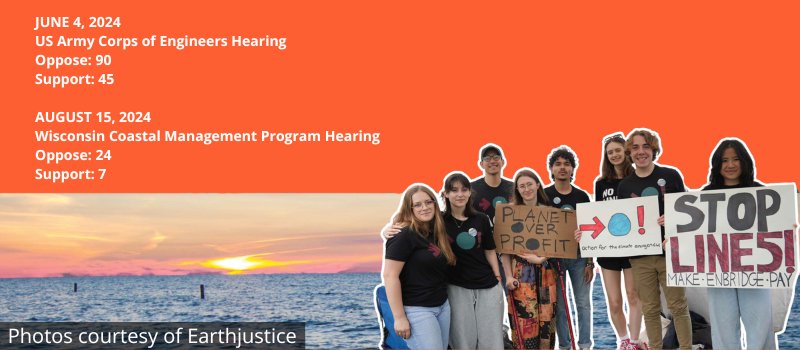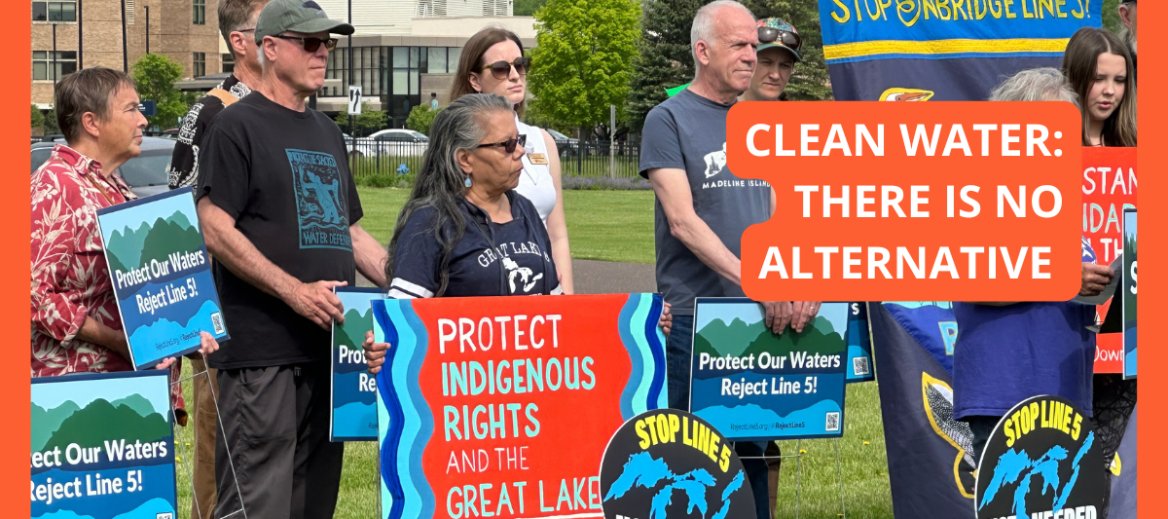There is nothing more precious than our water and our future.
With this rally cry for all of creation, we walk with Pope Francis, our placards held high, declaring our commitment to care for our common home.
And in sovereignty, we stand with the Bad River Band of Lake Superior Chippewa on their sacred land in northwestern Wisconsin. We stand at the wellspring
of their water and their future, now compromised by Enbridge Inc., a multinational pipeline and energy corporation that transports crude oil and natural gas through Canada and the United States. The company’s literal fault line, entrenched in 12 miles of the Bad River reservation, is Line 5.
Enbridge, according to the federal court and by the company’s own admission, has been trespassing across the Bad River reservation since 2013 when easements expired and the band declined to renew them. While a federal judge ordered Enbridge to remove Line 5 from the reservation by June 16, 2025, Enbridge proposes rerouting Line 5 upstream of the Bad River watershed. It is a move that would mean trenching, drilling back and filling hundreds of wetlands and streams which play a critical role in preventing flooding and protecting lives and infrastructure. The work is overflowing with potential for an oil spill. At risk are the water, fish, plants, animals, humans and so much more — the lifeblood of the tribe and all of creation.
In June FSPA stood with the tribe amidst a crowd of over 100 people at a hearing held in Ashland, Wisconsin, regarding environmental assessment of the Line 5
expansion. The sisters’ voices and messaging were clear. “The pipeline’s impacts on our economy, natural resources, public health and its violations of Indigenous
rights are unacceptable. Residents of the Great Lakes should not be forced to assume such risks for a project that is economically unviable in the long-term and serves no clear, public purpose.
“Fossil fuels, especially oil, are known to pollute. With the decline in global oil demand, rapid ongoing transition to renewable energy and urgency of the climate crisis, more and more scientists are calling for clean energy. Our hope is that the ultimate decision makers for this project think long-term; not about us, but generations to come.”
At the end of August, Earthjustice, a nonprofit, environmental law firm representing the Bad River Band in opposition to the Line 5 pipeline reroute, hosted a news conference to provide further opportunity for public comment and facts regarding the reroute’s potential detriment to all of creation.

Gussie Lord, managing attorney of Earthjustice’s Tribal Partnership Program, missioned to ensure the protection of Indigenous natural and cultural resources Indigenous community, said, “We know that this reroute is not the solution to the danger of the current pipeline. In fact, it really extends the dangers of the pipeline and increases the threat of devastating oil spills to the Bad River reservation, watershed and Lake Superior watershed. Throughout the U.S., over 150,000 people have spoken out and submitted comments to the army corps in opposition to this pipeline. The truth is that people don’t want this fossil fuel infrastructure entrenched. They don’t want threats to the Great Lakes, and we really appreciate the Bad River Band’s leadership here.” Several others offered testimony.
Robert Blanchard, Bad River Tribe’s chief executive officer and chairman
Robert spoke of the tribe’s cultural and economic sustenance of Lake Superior wild rice and fish and what the loss of the resources would mean for the community. “If something were to happen … it could really damage our wild rice crop for many, many years to come, maybe forever.” Robert has also relied on fishing to feed his family. “It is a way of life for us. It would put a hardship on most of our families. That is what we’re fighting for. Our homelands are our way of life.”
Isak Drangstveit, University of Wisconsin Madison student activist of Action for the Climate Emergency
“Studies suggest that over two-thirds of youth in America are plagued by something called ‘climate anxiety.’” The pipeline’s footprint “accounts for 19 million cars per year in carbon emissions and is a direct violation of tribal sovereignty. My generation is afraid of large oil companies, including Enbridge, but we are afraid of the regulators who have ignored the overwhelming scientific evidence and public opposition to the continued operation of Line 5. It must be shut down.”
Abby Novinska-Lois, Healthy Climate Wisconsin’s executive director
“Line 5 has spilled 35 times, releasing over 1.3 million gallons of toxic oil. That’s why over 22 trusted health organizations … more than one million physicians and
health professionals … across the country are opposed to the Line 5 project. Clean water is foundational for public health. It is needed … for our food, hygiene and mental health. We are speaking up because this project would lock us into a future with more fossil fuels, which drive climate changes that sickens our communities.”

